The accident happened on a Thursday—one I’ll never forget. It was pizza night, like always. We had just pulled into the driveway when the phone rang. A few moments later, I hung up, turned to my son Micah, and spoke the words that would change everything.
Zayden’s parents were gone. A car crash. Sudden. No warning. Just… gone.
Micah froze on the porch. He didn’t speak. He didn’t move. He simply sat down on the steps as the summer night wrapped around us like a heavy fog. Then, in the softest voice, he asked, “Where will Zayden go?”
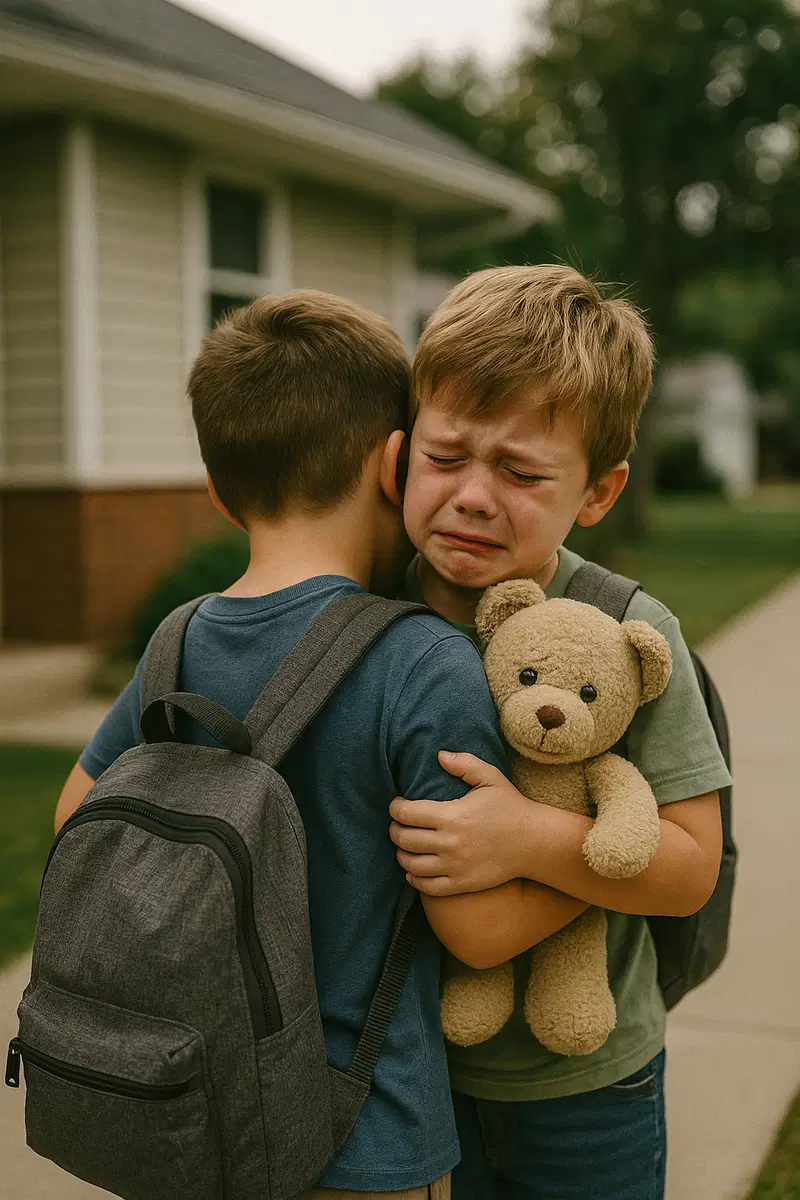
For illustrative purposes only
That night, I saw my son cry in a way I’d never seen before. Not a tantrum. Not frustration. But grief—raw, shaking, soul-deep grief that seemed to tear through him. The next day, at the hospital, Zayden sat quietly in a plastic chair, clutching a worn-out teddy bear. His eyes never left the floor—until Micah walked in.
The second he saw him, Zayden ran. He wrapped his arms around Micah like he was the only solid thing left in the world.
“He can stay with us,” Micah said, voice firm. “I’ll take care of him.”
But the system had its own rules. The caseworker, though gentle, explained that Zayden would be placed with a foster family while permanent arrangements were sorted.
Micah was heartbroken. He pleaded. He argued. He cried himself to sleep for weeks. And the room we had prepared at the end of the hall stayed empty.
What Micah didn’t know was that behind closed doors, we were doing everything we could—background checks, interviews, parenting classes, paperwork that never seemed to end. We didn’t tell him. We were afraid to offer hope we couldn’t promise.
Then, months later, we called him outside.
He sighed dramatically, dragging his feet like only a 9-year-old can. “What is it?” he mumbled.
We just pointed to the driveway.
There, holding the same teddy bear and looking far too small for the backpack on his shoulders, stood Zayden.
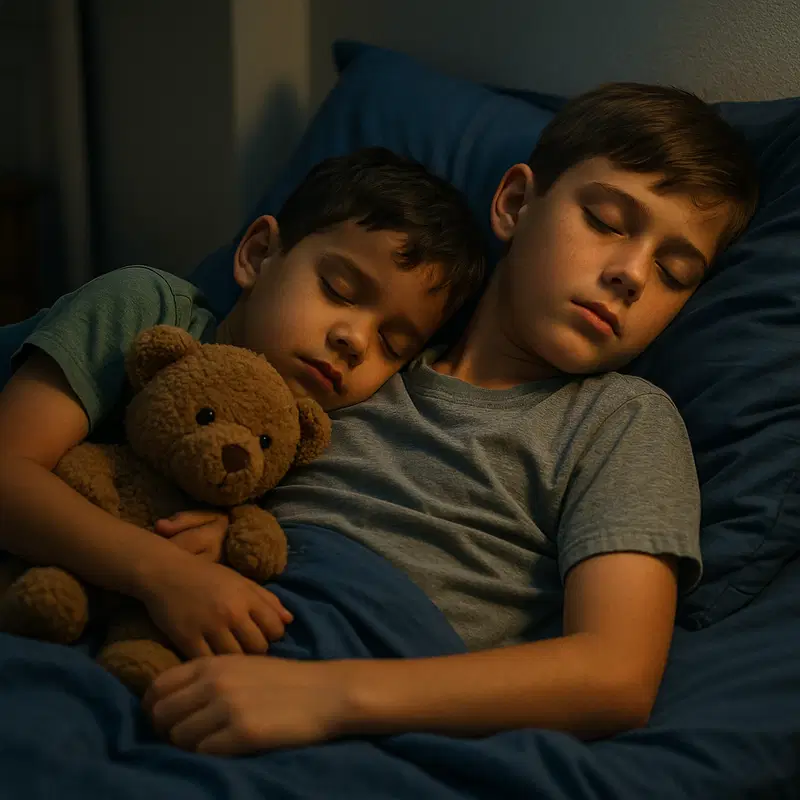
For illustrative purposes only
The moment he saw Micah, he lit up. He ran, as if no time had passed, as if nothing had ever come between them.
Micah met him halfway, arms open, tears falling.
“Are you staying?” he asked, breathless.
“Permanently,” I said, barely choking the word out.
What came after was a joyful blur—laughter, wild hugs, endless questions, and plans for Pokémon battles and spaghetti dinners. That night, Zayden fell asleep beside Micah, teddy bear between them. I stood in the doorway and just… watched.
Something broken had found a way to mend.
But healing isn’t always linear.
At first, life was almost too good. They were inseparable—like brothers born to different mothers. Our home echoed with laughter and loud dinners and childhood chaos.
Then the cracks began to show.
Zayden had night terrors—screams that scraped his throat raw. He flinched at loud noises. He refused to go near cars. We found him more than once hiding in the closet, rocking silently, trying to make the fear go away.
And Micah? He never left his side.
He became Zayden’s protector, his shadow. At school, at home, in every moment. He whispered forgotten lines during school plays. He stood up to kids who teased. He carried Zayden’s fears like they were his own.
It was beautiful—but too much for one child to bear.
One evening, I sat Micah down and said gently, “You know it’s okay to just be a kid sometimes, right?”
He lowered his gaze. “I made a promise.”
“To who?”
He shrugged. “To God. That if Zayden ever came home, I’d protect him. Always.”
My heart broke and swelled all at once. Because I knew that kind of love. The kind that makes you carry more than you should, just because someone needs you to.
But no child should carry that weight alone.
We got both boys into therapy. They hated it at first—claimed it was boring, said the therapist smelled like raisins. But little by little, something shifted.
Zayden began to talk. About the crash. About waking up in the hospital, not knowing where his parents were. About the silence that followed.
Micah opened up too. He admitted he missed our Saturday pancake mornings. He worried that if he messed up, Zayden might be taken away again.
There were tears. But healing lives in the small things. Zayden finally sleeping through the night. Micah saying yes to a sleepover. Progress.
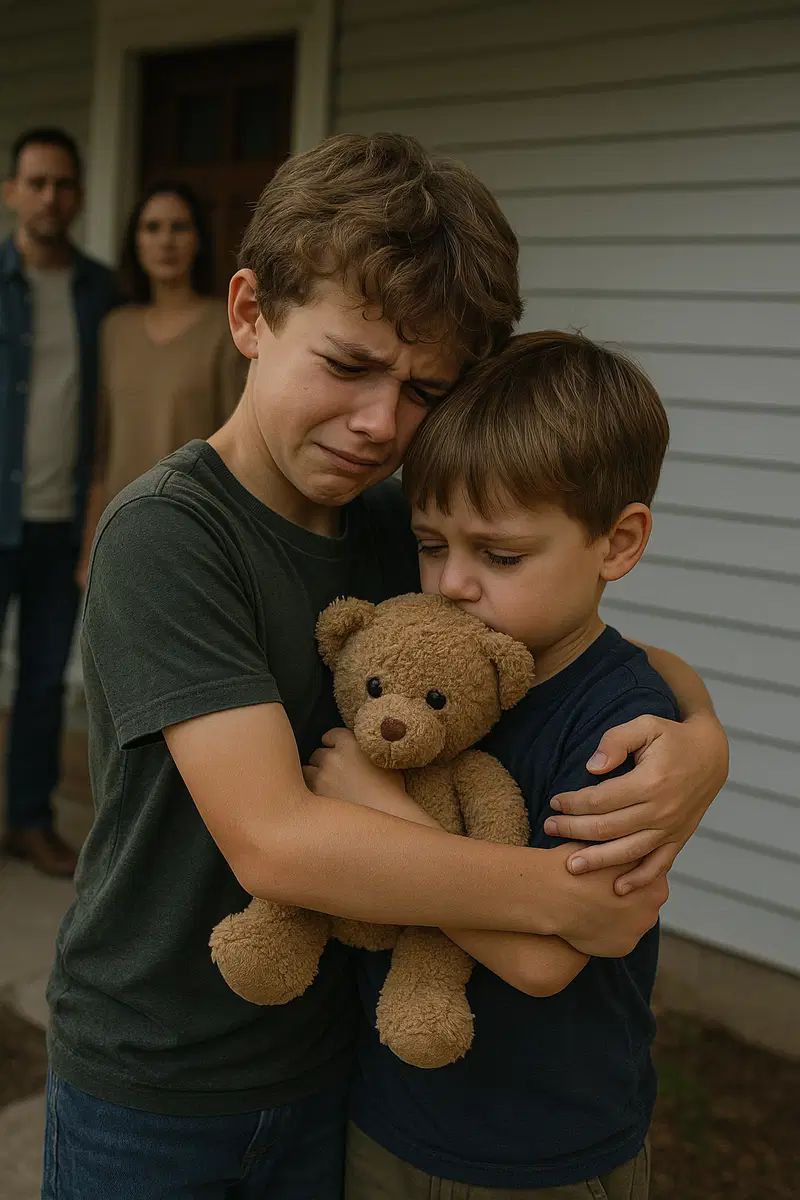
Then something unexpected happened.
About eight months after Zayden moved in, we got a phone call from a woman named Helena—from Missouri. She was Zayden’s maternal aunt. They had been estranged, but she had found out about the accident and had been searching for him ever since.
She wanted to meet him.
We were stunned.
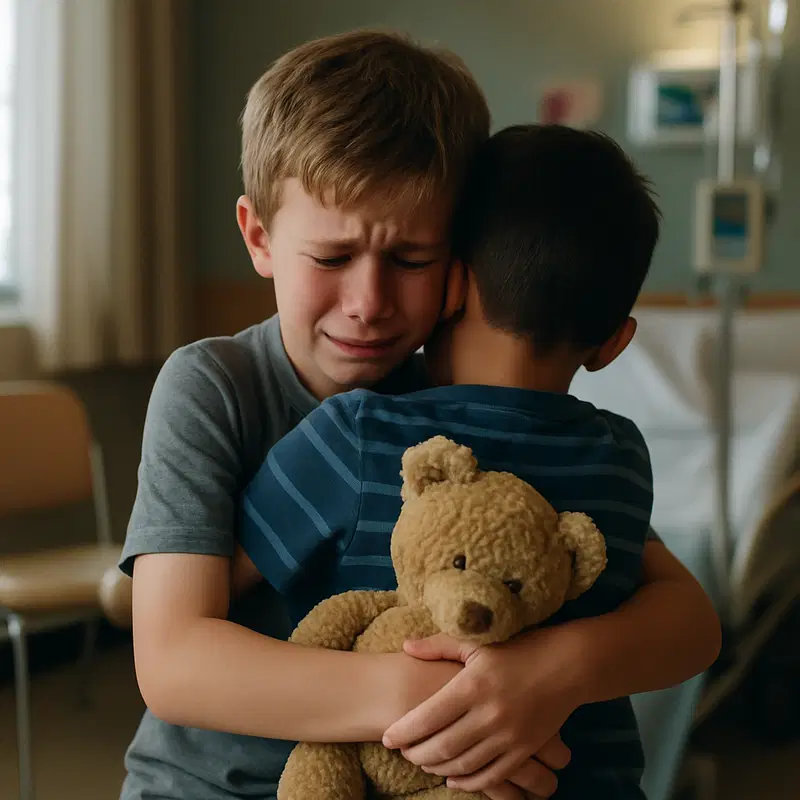
For illustrative purposes only
The caseworker confirmed everything. Background clear. Stable job. Good home. She was family. And she wanted to be part of Zayden’s life.
Micah overheard one of our conversations. “Is she going to take him away?”
I didn’t know what to say. Legally, she had the right to.
We told Zayden. His hands trembled. “Do I have to go?”
“No,” I said. “But we think it would be good to meet her. Just once.”
The visit was set. We were nervous. Zayden barely slept. Micah didn’t eat.
Then Helena arrived.
Late thirties. Warm smile. Kind eyes. She brought old photos of Zayden’s mom, stories about their childhood, a box of his father’s CDs. She didn’t pressure him. She just said, “I didn’t know about you. But now that I do, I want to be here—if you’ll let me.”
Zayden asked questions. He listened. He didn’t smile. But he didn’t shut down either. That night, he said he wanted to see her again.
So we arranged more visits.
Micah stayed quiet. Until one night, as I tucked him in, he whispered, “If she takes him… I won’t have a best friend anymore.”
“You’ll always have each other,” I told him. “No matter where he is.”
“I made a promise,” he said again, like it explained everything.
“I know,” I said gently. “But sometimes, loving someone means letting them have more people who love them too.”
He nodded, tears clinging to his lashes.
A few months later, Zayden made his choice.
He wanted to stay with us—and visit Helena during school breaks.
It was the best possible outcome. And it worked.
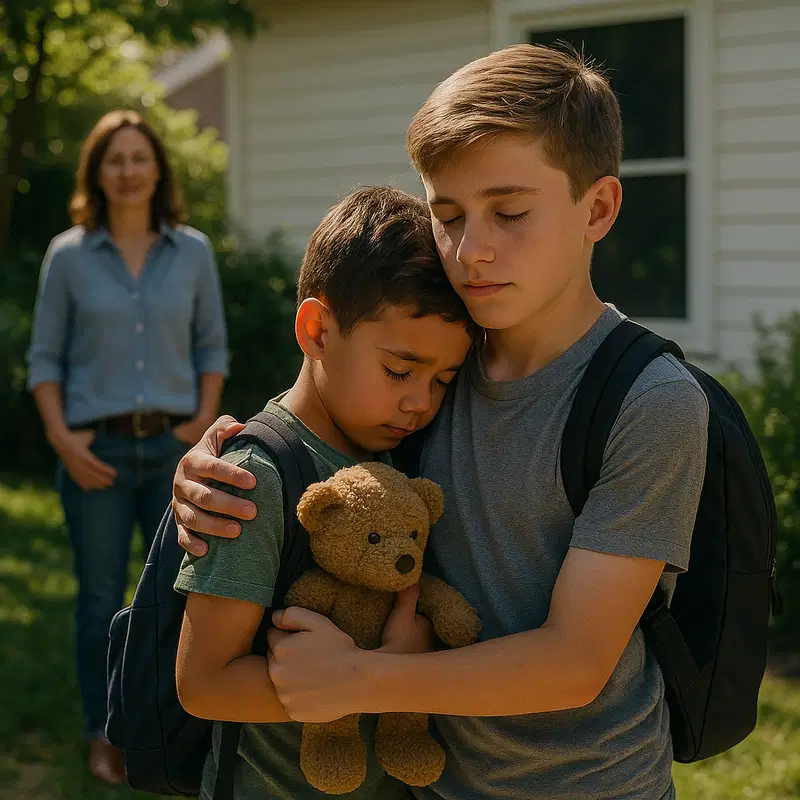
For illustrative purposes only
Helena became part of our lives. She came to games. Sent cards. Helped with Halloween costumes. She never replaced anything. She simply added love to what was already there.
Years passed. The nightmares faded. Zayden stopped hiding in closets.
And Micah? He grew into someone even stronger—someone who knew what it meant to fight for the people you love.
One day, Zayden handed him the teddy bear.
Micah blinked. “Why are you giving me this?”
Zayden smiled. “Because I’m okay now. You carried me when I couldn’t carry myself. But you can let go now.”
Micah cried. This time, not from pain—but from peace.
They’re both in high school now. Taller than me. Still inseparable. Still laughing over who snores louder. But now, the laughter is lighter. Freer.
Because some promises are meant to be kept.
And some friendships? They outlive grief. They outshine fear.
They heal.
Let me know if you want this shortened or adapted into an Instagram carousel caption, article teaser, or TikTok narration script.
